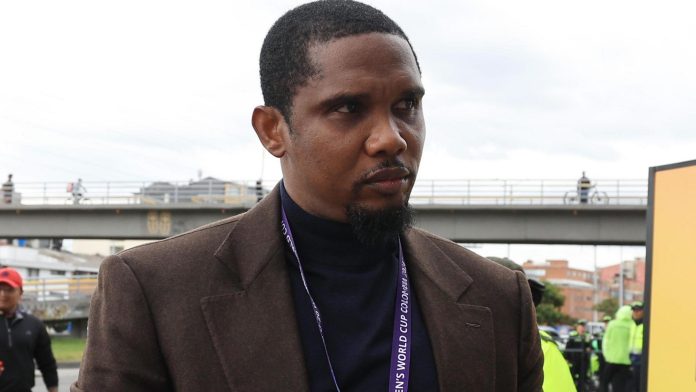Football legend and current president of the Cameroon Football Federation (Fecafoot), Samuel Eto’o, has found himself in the middle of another controversy. FIFA has imposed a six-month ban, prohibiting Eto’o from attending any Cameroon national team matches for both men’s and women’s teams across all age groups. The decision came after an investigation into misconduct during the Under-20 Women’s World Cup round-of-16 match between Cameroon and Brazil in September 2024.
This latest scandal adds to the growing scrutiny surrounding Eto’o’s leadership and conduct as the head of Fecafoot, marking yet another chapter in the mounting controversies that have followed his post-football career.
The Reason Behind Eto’o’s FIFA Ban
Samuel Eto’o’s ban stems from two charges of misconduct related to his actions during the Under-20 Women’s World Cup. The match in question saw Cameroon facing Brazil in a high-stakes round-of-16 game in September 2024. According to FIFA’s disciplinary committee, Eto’o was found guilty of “offensive behavior” and violations of fair play principles. While the exact details of his actions during the match have not been fully disclosed, the ruling has sparked widespread attention and debate across the football community.
The six-month ban means that Eto’o will not be allowed to attend any Cameroon national team matches, regardless of whether they are for men’s or women’s teams, across any age category. This punishment is expected to impact his leadership as Fecafoot president, especially since he has been a visible figure in the stadiums during key matches for both senior and youth teams.

FIFA’s Ruling: Offensive Behavior and Fair Play Violations
FIFA’s disciplinary committee was clear in its findings: He exhibited offensive behavior and violated fair play principles during the Cameroon vs. Brazil match. The organization, known for strictly enforcing its code of conduct, made the decision to suspend Eto’o for six months, marking a significant blow to his role in Cameroonian football.
FIFA emphasized the importance of upholding standards of conduct, particularly for individuals in leadership positions like Eto’o. His behavior was deemed incompatible with the responsibilities of a federation president, and the ruling serves as a reminder that no individual, regardless of their status or past achievements, is above the rules of the game.
: FIFA have banned Samuel Eto’o for 6 months from attending Cameroon matches for offensive behaviour and misconduct.
(Source: @FIFAcom) pic.twitter.com/xxbxaTtKwo
— Transfer News Live (@DeadlineDayLive) September 30, 2024
This is not the first time Eto’o has found himself in hot water. Just months before this ruling, Eto’o was fined by the Confederation of African Football (CAF) after being investigated for violations of ethics and integrity. The back-to-back controversies have cast a shadow over his role in Fecafoot and raised questions about his ability to lead the organization effectively.
The Impact on Eto’o’s Reputation and Leadership at Fecafoot
The six-month ban is undoubtedly a significant blow to Samuel Eto’o’s reputation, not only as a former football icon but also as the president of Cameroon’s Football Federation. Eto’o, who has been at the helm of Fecafoot since 2021, has sought to reform the organization and lead Cameroon’s footballing resurgence. His presidency, however, has been mired in controversies that have threatened to overshadow his efforts.
Eto’o’s leadership style, which has been described as charismatic but at times controversial, has been called into question in recent months. The FIFA ban comes on the heels of a fine imposed by CAF for alleged violations of ethical conduct, further straining his public image. While he has been praised for his vision and commitment to Cameroonian football, these disciplinary actions have caused many to question whether he can effectively lead the federation without being distracted by his personal legal issues.
Fecafoot, under his leadership, has seen progress in various areas, including youth development and investments in infrastructure. However, his involvement in multiple controversies threatens to undermine those achievements. Critics argue that these legal and ethical issues could hinder his ability to focus on the long-term development of football in Cameroon, especially as the country continues to prepare for upcoming international tournaments.

Eto’o’s History of Controversy
This is not the first time that Samuel Eto’o has faced disciplinary action. In June 2021, he was handed a 22-month suspended prison sentence and fined $1.7 million after pleading guilty to a charge of tax fraud related to his image rights during his time playing in Spain. This incident raised concerns about his business dealings and financial ethics.
In addition to his legal issues, Eto’o has faced allegations of misconduct in his role as Fecafoot president. The CAF investigation earlier in 2024 centered on accusations of violations of ethics and integrity, resulting in a fine for the 43-year-old. These recurring issues have painted a troubling picture of Eto’o’s post-football career and raised questions about his suitability for leadership roles in football.
What’s Next for Eto’o?
As Eto’o serves his six-month ban from attending national team matches, the question of his future in football governance looms large. Will he be able to regain the trust of the football community in Cameroon and beyond? Or will this latest scandal mark the beginning of the end of his tenure as Fecafoot president?
The pressure is mounting on him to address these controversies head-on and restore his credibility. Some believe that a period of introspection and public apologies may be in order, while others suggest that it may be time for Eto’o to step aside and allow new leadership to take the reins at Fecafoot.
ALSO READ:
- CAF president Dr.Patrice Motsepe Unveils Five Game-Changing Initiatives to Shape African Football’s Future
- Motsepe Receives Strong Backing for a Second Term as CAF President


